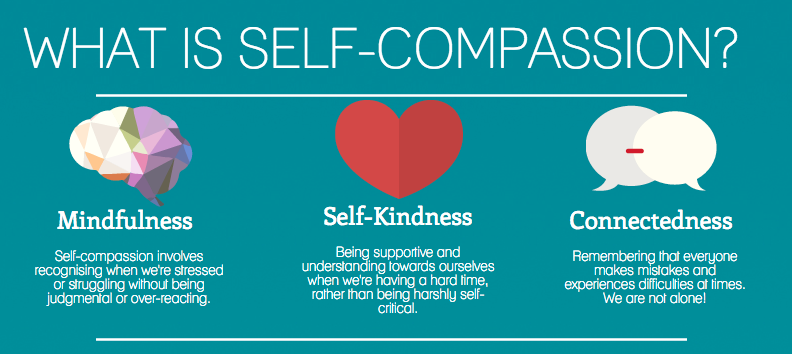The days between Christmas and New Year’s Day are a good time to practice self-compassion. But what is that, really? Is it selfish? Is it full of self-pity? Am I just striving for more “Me” time, or is there something deeper going on here?
Wellness – body, mind, soul
NewLeaf Total Wellness Centre has a helpful article on the “What is it?” questions we might have about this elusive practice.

Simply stated, this attention to self care is about being as kind to oneself as we might be to a friend…or even to a stranger.
How do we know if we need to spend a little effort in this area? Our biggest indicator is that we’re giving ourselves a hard time. Notice the ways in which you talk to yourself. Are you impatient? Judgmental? Do you criticize and blame and guilt yourself for everything from the feeling you just had to the thought you just thunk?
If you’re anything like me, you might be thinking, “I’m not too hard on myself. I tell myself the truth.” And sometimes we do need to give ourselves a little swift kick. Most of the time? Most of the time we need to talk to ourselves like we would attend to our best friend, or even a little child.
Because life is tough enough
It can be hard to see our own lives through a compassionate lens. We might have the habit of assessing other peoples’ complex stories as painful, or difficult. We might minimize our own distress, or even suffering.
NewLeaf goes on to say,
“There are three main components (or skills) of self-compassion.
- Self-kindness is demonstrating to yourself the kindness that you have towards others when you are struggling.
- Common humanity involves acknowledging that everyone suffers. Suffering is a part of life and as humans we all suffer. It’s recognizing that if you are suffering it is not because there is something wrong with you, but that everyone has moments of suffering. Inadequacies and imperfection is part of the shared human experience.
- Mindfulness is noticing when we are suffering and attending to our struggle. Being mindful is to observe negative thoughts with openness. As Dr Kristen Neff, the pioneer of self-compassion, states ‘we can not ignore our pain and feel compassion for it at the same time.’ Lastly, a key piece of mindfulness is to remain non-judgemental when we notice our suffering and negative thoughts.”
Can you see yourself in this mix somewhere? Is there room for you to tend to your own heart, mind, and body a little more gently as the year wraps-up?
As we launch (step tentatively?) into 2020, what would it be like to exchange a little self-judgment for a practice of self-compassion? What if we start by noticing when we’re being too rough with our interior self, and go from there?
We’ve got important giving and loving and sharing and creating to do. Let’s do that from a healthy and thriving place!